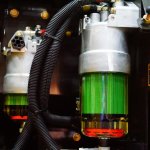How Do Hydraulic Power Units Work?
Machinery that uses hydraulic power is all around us: cars, airplanes, bulldozers, forklifts, and roller coasters, to name a few. But what is hydraulic power, exactly, and how does it work?
Also known as fluid power, hydraulic power is the controlled movement of pressurized fluid to generate power – and lots of it. This is why hydraulic power is used in machines that conduct repeated and heavy operations, from oil extraction to large construction lifts.
What’s more, a machine that uses a hydraulic system often produces the hydraulic energy in a relatively small space, an engineering feat that is largely attributed to hydraulic power units.
What Is A Hydraulic Power Unit?
Essentially the heart of the machine, a hydraulic power unit (HPU) is the system of interconnected pumps, filters, and valves transmitting the fluid flow that converts mechanical energy into hydraulic energy. In fact, hydraulic power units’ unique design – following Pascal’s law of physics – creates more power than traditional electric and mechanical systems.
An HPU is made of an engine or motor, a reservoir, hydraulic pump, and hydraulic cylinder. In simple terms, the motor powers the pump, and the pump moves the hydraulic fluid from the reservoir through the HPU system. When the hydraulic cylinder has converted the hydraulic energy into mechanical energy, valves then control and direct the flow of the liquid in order to provide power and reliability to the machinery.
A hydraulic braking system in a car is a great example. When the driver brakes, the mechanical force on the brake pedal is converted by a master cylinder into hydraulic pressure, which is then applied to the final drum to slow the vehicle.
With that being said, because HPUs are used for numerous and various purposes, they are designed and sized according to their intended purpose.
Air & Hydraulic Equipment, Inc. specializes in standard, custom, and OEM hydraulic power units. Contact us about the industrial hydraulic power units you need today!
Types of Hydraulic Power Units
Hydraulic power units fall into two main categories: single-acting and double-acting. The difference is just like it sounds.
With a single-acting HPU, it only has pressing power because the hydraulic fluid enters and forces a piston in one direction. Single-acting HPUs are found in both internal combustion engines (e.g. diesel engines) and external combustion engines (e.g. Stirling engines), as well as pumps and hydraulic rams.
A double-acting HPU, on the other hand, has pressing and pulling power as it pumps hydraulic fluid to both sides of the piston. Double-acting HPUs are commonly found in steam engines and heavy equipment.
HPUs also vary in size and, naturally, are used for different purposes:
- Micropower pack units – can easily be integrated with single or double-acting without using a solenoid control valve
- Mini power pack units – well suited for mobile applications
- Standard hydraulic power pack units – well suited for industrial and in-plant operations that involve heavy loads and pressure ratings
- Hydraulic power unit stations – considerably large and designed for specific uses
If your industrial business is looking to incorporate quality hydraulic equipment into your daily work routine, you’ve come to the right place!
Contact Air & Hydraulic Equipment, Inc. for outside service and sales support in Georgia, Tennessee, and Virginia!










